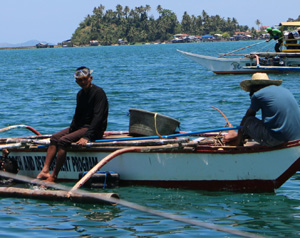A mussel farmer from Barangay Bahay, Tarangnan, Samar has realized the benefits of using longline method in mussel production. From producing 150 sacks, he can now produce 220 sacks of mussels using the longline technology.
Mario S. Cano, Sr. is one of the collaborators selected to test mussel longline culture method. The trial is part of the National Mussel S&T Program, which is being implemented by the Samar State University College of Fisheries and Marine Sciences (SSU-COFMAS) and funded by the Philippine Council for Agriculture, Aquatic and Natural Resources Research and Development of the Department of Science and Technology (DOST-PCAARRD).
The mussel trials aim to determine the growth rate and survival of mussels using longline culture method. Compared with the traditional stake method, mussel longline culture technology is more efficient as it can produce relatively higher production per unit area, superior quality mussels, and reduce siltation in mussel beds.
 Cano was identified as a collaborator as he has been engaged in mussel farming since he was 15 years old in Cambutatay, Samar. Prior to his adoption of the new technology, he had been using the conventional stake method.
Cano was identified as a collaborator as he has been engaged in mussel farming since he was 15 years old in Cambutatay, Samar. Prior to his adoption of the new technology, he had been using the conventional stake method.
In the 70s, Cano said that his mussel farm composed of 100 bamboo poles yielded up to 150 sacks. This could give him a net profit of P15,000 sold at P180 per sack. In the 80s, however, the mussel industry collapsed mainly due to the paralytic shellfish poisoning (red tide) and sprung back in the early ‘90s.
During the early stages of implementation, Cano was hesitant to use the longline method as the mussels could be easily harvested by poachers and by-passers. In the first trial run, however, he noted a promising yield and good quality mussel meat. Comparatively, his stake method did not yield as much as the longline method due to mass mortality of mussels caused by unknown virus in the area.
Using the longline method, Cano now produces 220 sacks of mussels from a hectare farm with 10 units of 100 meters longline. From this harvest, he generated a profit of P81,000 from the mussels, which he sold at P450/sack in the local market. Now, he can afford to send his children to college, acquire home appliances, and financially support the needs of his family.
